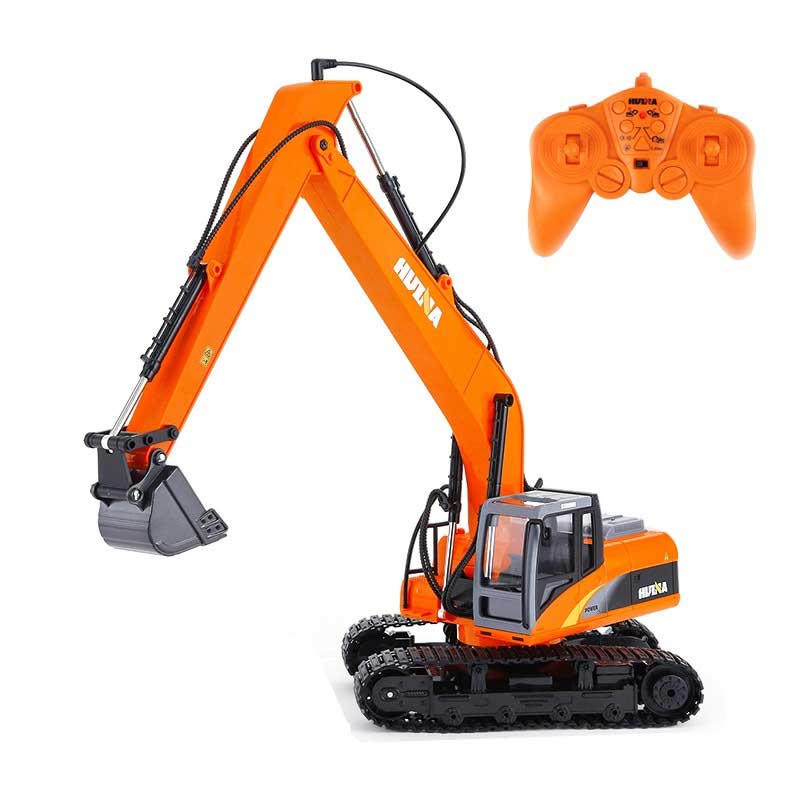The Future of Excavation: Why a rc excavator is Here to Stay
Recognizing Exactly How Excavator Works and Its Influence On Efficiency
Excavators play a crucial function in building and construction and mining operations, counting on a complex interplay of mechanical and hydraulic systems. Their ability to execute a range of tasks hinges on both their layout and the modern technology integrated within. Recognizing these elements can substantially affect functional efficiency and performance. As innovations remain to improve the sector, one must take into consideration just how these modifications will certainly affect future methods and performance.
The Basics of Excavator Mechanics

The Duty of Hydraulic Equipments in Excavators
At the heart of excavator procedure lies the hydraulic system, which plays a critical duty in powering the maker's movements and functions. This system utilizes pressurized hydraulic fluid to transfer energy, allowing different actions such as excavating, moving, and lifting. By taking advantage of the concepts of hydraulics, excavators can carry out jobs with amazing accuracy and pressure, improving overall operational efficiency.The hydraulic system includes key components, including valves, pumps, and cyndrical tubes, which collaborate to manage the circulation and direction of the fluid. When the driver involves the controls, the hydraulic liquid is routed to certain cylinders, translating the driver's commands into physical movement. This device enables for smooth and receptive actions, which are vital in construction and excavation atmospheres. double e volvo rc excavator. The effectiveness of the hydraulic system directly impacts the productivity and adaptability of the excavator, making it an important element in modern excavation processes
Key Elements of an Excavator
Recognizing the essential components of an excavator is vital for grasping exactly how this effective maker runs. An excavator is composed of several substantial components, consisting of the undercarriage, house, container, arm, and boom. The undercarriage supplies security and movement, typically including wheels or tracks to navigate various surfaces. The house consists of the engine and hydraulic systems, enabling the operator to manage motion and power the device. The boom extends from the home, making it possible for vertical reach, while the arm attaches to the pail, helping with excavating and lifting operations.Additionally, the cab houses the driver, equipped with controls for precise maneuvering. Each of these parts plays a crucial role in the excavator's overall functionality, adding to its effectiveness and effectiveness on building websites. Understanding these parts aids in preserving and optimizing excavator efficiency, guaranteeing tasks are finished securely and successfully.
Accessory Flexibility and Its Benefits
Attachment versatility is an essential element of excavators, making it possible for operators to switch in between different devices tailored for certain jobs. This versatility not just improves work effectiveness but also adds to cost-effectiveness by lowering the need for multiple machines. Understanding the different kinds of accessories offered can substantially influence the general efficiency and capability of an excavator on job sites.
Kinds of Add-ons
While excavators are mostly identified for their digging capabilities, their true flexibility depends on the vast variety of attachments available. These attachments improve the excavator's functionality, permitting it to do various jobs beyond excavation. Typical attachments include buckets (for digging and scooping), hydraulic thumbs (for realizing materials), and augers (for piercing openings) Grapples are utilized for relocating and dealing with debris, while rippers can break up tough surfaces. Other specialized add-ons, such as plates and plows, enable excavators to adjust to certain job demands. This variety not only increases the device's utility across different markets, consisting of construction, demolition, and landscaping, yet likewise permits operators to tailor their devices to satisfy certain task demands successfully.
Increased Job Performance
Maximizing task performance is a main benefit of using different excavator accessories. Various attachments permit an excavator to do several jobs without needing to switch over devices, conserving valuable time and labor. Using a hydraulic hammer can break concrete while a container attachment can excavate dirt, enabling a seamless operations. This convenience lowers downtime linked with devices modifications and boosts productivity on-site. Furthermore, specialized attachments boost precision in jobs such as grading or landscape design, bring about higher quality outcomes. The capacity to adjust to different task requirements not just streamlines operations yet also reduces the requirement for extra click here for more machinery, guaranteeing that projects are finished swiftly and successfully. Overall, add-on versatility significantly adds to increased work efficiency in excavation work.
Cost-Effectiveness and Versatility
Cost-effectiveness is a significant benefit of making use of flexible excavator add-ons. These attachments permit a single excavator to do multiple tasks, reducing the demand for extra equipment and labor - double e volvo rc excavator. By switching between containers, hammers, and grapples, operators can take on numerous tasks, from excavating to demolition, consequently maximizing tools utilization. This flexibility not only reduces functional prices however additionally reduces downtime connected with changing devices. Furthermore, the ability to personalize excavators with specialized attachments enhances productivity, as they can efficiently manage diverse tasks according to task needs. To conclude, additional resources the combination of cost-effectiveness and versatility in excavator attachments contributes to boosted functional efficiency and resource allowance in building and construction and excavation projects

Advanced Technology in Modern Excavators
Modern excavators are progressively outfitted with sophisticated technology that transforms excavation processes. Automation streamlines procedures, while boosted fuel performance lowers functional prices. In addition, smart control systems improve accuracy and safety and security, marking a significant evolution in excavation equipment.
Automation in Excavation Processes
As excavation technology develops, automation has actually become a vital component in enhancing performance and accuracy on work websites. Modern excavators are geared up with innovative automated systems that help with jobs such as grading, digging, and trenching with marginal operator intervention. These systems make use of sensing units, GPS, and artificial intelligence algorithms to ensure accurate positioning and deepness control, considerably minimizing the margin for mistake. Furthermore, automation permits operators to concentrate on tactical decision-making as opposed to manual controls, causing improved efficiency on the whole. Such developments not just streamline process yet also improve security by minimizing human error in complicated procedures. Subsequently, the integration of automation in excavation procedures stands for a considerable improvement in construction innovation, driving the sector towards greater efficiency and effectiveness.
Improved Gas Performance
Developments in innovation have actually additionally caused considerable enhancements in gas performance for modern excavators. Modern machines are furnished with sophisticated engines that enhance power outcome while lowering fuel usage. These engines utilize ingenious combustion technologies, such as turbocharging and direct fuel shot, to enhance efficiency and performance. In addition, light-weight materials in building decrease overall weight, permitting much less power expenditure during procedure. The intro of variable speed controls enables drivers to change engine performance according to specific jobs, further decreasing gas use. Because of this, these improvements not only lower functional expenses but likewise contribute to ecological sustainability by minimizing emissions. Overall, boosted fuel effectiveness in excavators is a necessary advancement that bolsters efficiency and economic stability in the building market.
Smart Control Systems
While drivers navigate increasingly complicated work sites, clever control systems in excavators have become crucial tools for boosting effectiveness and accuracy. These sophisticated modern technologies use sensors and algorithms to check various criteria such as load weight, surface problems, and operational efficiency. By automatically changing hydraulic features, smart systems maximize machine performance, bring about enhanced productivity and decreased endure components. Furthermore, drivers take advantage of intuitive user interfaces that give real-time feedback and diagnostics, permitting for educated decision-making. This integration of innovation not just streamlines operations however additionally minimizes human error, adding to safer workplace. As the construction industry proceeds to advance, smart control systems will play an essential role in shaping the future of excavator effectiveness and effectiveness.
Enhancing Functional Performance With Excavators
Excavators play a vital duty in enhancing operational effectiveness throughout various building and excavation tasks. Their versatility permits multiple tasks, including product, excavating, and lifting handling, which enhances workflows and decreases the need for additional equipment. With effective hydraulic systems, excavators can execute sturdy jobs with accuracy, significantly decreasing the time called for to full jobs. The combination of sophisticated technology, such as GPS and automated controls, better maximizes their operation, enabling operators to attain higher accuracy and reduce product waste. Furthermore, contemporary excavators are developed to eat much less fuel and minimize exhausts, contributing to both price financial savings and environmental sustainability. By making use of excavators properly, building and construction teams can boost efficiency, satisfy project target dates, and boost general site monitoring. This multifunctionality and performance make excavators essential tools in the modern-day building landscape.
The Future of Excavators in Construction and Mining Industries
As the building and construction and mining markets evolve, the future of excavators is positioned for significant improvement driven by technological technology and altering functional demands. Breakthroughs in automation and expert system are reshaping excavator capacities, permitting improved accuracy and effectiveness in procedures. Independent excavators are emerging, minimizing the demand for human intervention and lessening the risk of accidents.Moreover, the combination of telematics and IoT modern technology enables real-time tracking of machine performance and anticipating upkeep, enhancing uptime. Environment-friendly layouts, including electrical and hybrid designs, are obtaining grip, aligning with sustainability goals within the industry.Additionally, the usage of innovative products and lighter designs improves gas performance while maintaining performance requirements. As these patterns progression, excavators will certainly play an essential role in meeting the enhancing demands for efficiency and safety and security in building and construction and mining, inevitably changing operational landscapes.
Often Asked Concerns
How Do Weather Affect Excavator Efficiency?

Climate condition substantially influence excavator performance, as rain and mud can prevent traction and security, while extreme temperatures might impact hydraulic systems. Operators must adjust to these variables to ensure ideal capability and security during procedures.
What Safety Actions Should Operators Comply With While Using Excavators?
Precaution for excavator drivers include putting on suitable individual protective tools, carrying out pre-operation examinations, making sure proper interaction with ground employees, preserving a secure distance from overhanging hazards, and sticking to established functional methods to stop crashes.
Exactly How Often Should Excavators Be Preserved for Optimum Performance?
Excavators must be kept routinely to ensure peak efficiency, generally every 250 operating hours or as defined by the supplier. Routine checks improve integrity, avoid unanticipated breakdowns, and prolong the lifespan of the devices.
What Is the Ordinary Lifespan of an Excavator?
The typical life expectancy of an excavator commonly ranges from 10,000 to 15,000 hours of procedure. Factors influencing longevity consist of upkeep practices, running conditions, and the quality of the maker itself, impacting general efficiency and efficiency.

Can Excavators Operate Uneven Surface Successfully?
Excavators can operate successfully on unequal surface because of their articulated styles and flexible tracks. These attributes allow them to preserve stability and grip, enabling efficient operation in difficult atmospheres generally run into in construction and landscaping projects. Each of these components plays an essential function in the excavator's general performance, adding to its effectiveness and performance on construction sites. Maximizing task effectiveness is a key benefit of utilizing various excavator accessories. While drivers browse increasingly complex job sites, clever control systems in excavators have actually arised as necessary devices for improving effectiveness and precision. Excavators play a vital role in enhancing functional performance across various construction imp source and excavation tasks. Breakthroughs in automation and man-made intelligence are reshaping excavator capacities, enabling for enhanced accuracy and effectiveness in operations.